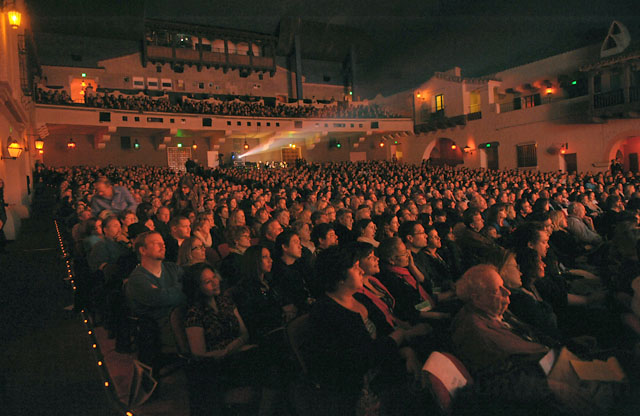SBIFF 2013 Mid-fest Report
Films Reviewed, Tributes Critiqued, and More

Santa Barbara International Film Fest (SBIFF) ’13 kicked off with a warmish wind of energy, with the “good by Opening Night film standards” Internet-perils cautionary tale Disconnect — reasonably good, apart from the orderly operatic finale. We were off and running, slinking toward darkened theaters and dipping into what’s shaping up to be a strong festival program this year. Fans of the international component have been heartened to find more emphasis paid to that part of the puzzle, but it remains a puzzle aimed at satisfying a wide range of filmic sidebars and special interests, making this fest definable by the terms of the beholders’ interests.
If there are two important points of in-house focus at SBIFF this year, it is the 10th anniversary of Executive Director Roger Durling’s inspired tenure at the helm, and the retrospective dedication to Mike deGruy, a filmmaker and critical component in the festival’s nature-film focus and outreach to children, who died on location in Australia during last year’s festival. To see brief snippets of deGruy’s work before feature films casts a revealing light on his great spirit, as a naturalist, filmmaker and adventurer.
Yes, there have been no-shows. Leonardo DiCaprio had a scheduling mishap that forced the cancellation of what would have been his second SBIFF tribute in the past decade, but the substitute is more than worthy, in the form of singular American director/auteur/wise guy Quentin Tarantino. Rumors of Gael García Bernal’s appearance at the witty fine film No to a fully packed Lobero Theatre house last Saturday afternoon proved unfounded, although the inspired Chilean director Pablo Larraín introduced his film by talking about the fundamental theme of embracing democracy: “If you don’t do it, someone else will do it for you.”
No, about the 1988 vote to oust Augusto Pinochet, was one of four foreign film Academy Award nominees screened last weekend, along with the striking Canadian film War Witch, an insider’s view of the shattered and reshaped life of a child soldier in sub-Saharan Africa; the Danish A Royal Affair, an unusually engaging 18th-century costume drama with political intrigue; and the Norwegian feel-good explorer’s saga, Kon-Tiki. In other feel-good news, The Sapphires, about an Aboriginal soul-sister group in the ’60s, gets the warm-and-fuzzies going with the best of them.
Latin American cinema has strong entries this year, with such titles as the Argentine Clandestine Childhood, an understated child’s-eye view of the “disappearing” era of the ’70s, and the poetically visual and meditative Colombian film La sirga. Speaking of deceptively meditative films with a poetic sense of style, the Swiss film Sister and the quietly, creepily dazzling German film Barbara got under our skin in an artful way.
Sister may, in fact, belong to an unofficial theme among foreign titles this year, the dysfunctional-family-saga genre, which would have to also include the violent yet emotionally vulnerable South Korean film Pietà and the delectable and crispy dark family satire from the Netherlands, The Deflowering of Eva van End. In a category of its own, the famed Italian Taviani brothers’ Caesar Must Die is a cinematic wonder, hard to describe, about an actual prison theater project’s production of Shakespeare in which layers of theater, reality, and the twain thereof blend toward some fresh filmic vision.
With the back-to-back Arlington Theatre tributes to awards-season stars, Ben Affleck and Daniel Day-Lewis, it became a study in contrast. Affleck, the once-scorned actor with bad-choice issues who has risen to great heights as a director (Gone Baby Gone, The Town, Argo), was slick and flowing with friendly show-biz patter. He talked about his transformation from his tabloid-splattered period to his artistic self-discovery: “I got overexposed and got sick of the paparazzi machine. I wanted out.” But Gone Baby Gone led him in the right direction. Accepting the hefty Modern Master trophy from his old Bostonian pal Matt Damon, Affleck demurred, “I certainly don’t feel like a master. I don’t feel that modern. I have a ‘greatest ’90s music’ cassette tape. … If there is a mastery to be learned, it’s a partnership.”
By contrast, Day-Lewis, the actor whose stunning filmography ranges from early highs (My Left Foot, My Beautiful Laundrette) to recent, even higher highs (There Will Be Blood, Lincoln) was much more cerebral and circumspect. Like any great artist, he seems a bit mystified about the process, from his highly selective method of choosing a role, with long breaks between each, to the influence of the finished product. “If something works and people take to it, I’m always amazed,” he told the Arlington crowd, thoughtfully. “I don’t know how it happened. It’s almost like I’m looking at somebody else’s work.” That’s called artistic transcendence, with the muse’s divine intervention.
Meanwhile, the lure of the “I” word is ever beckoning us to do without sleep and shrug off work if possible.



